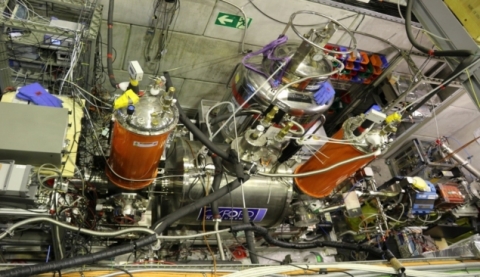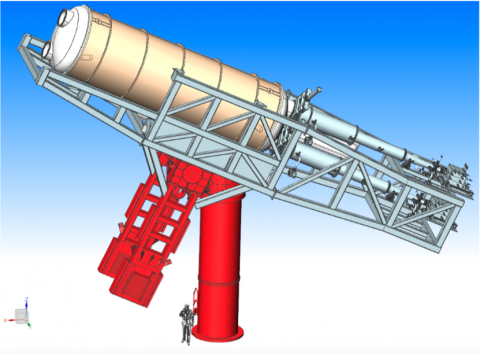Dark Matter
BASE develops a new technique to detect ultralight dark matter.
In a recent work published in Physical Review Letters [1], the Baryon Antibaryon Symmetry Experiment (BASE) at CERN has placed new limits on a possible coupling between photons and hypothetical axionlike dark matter particles with masses…
Read moreBabyIAXO submits for publication its Conceptual Design Report
The International Axion Observatory (IAXO) will search for axions or axion-like particles emitted by the Sun with unprecedented sensitivity. Axions are hypothetical particles that appear in extensions of the Standard Model that include the Peccei-…
Read moreBASE probes antimatter - dark matter interaction
In a recent paper, the BASE collaboration presented results from a direct search for interactions of antimatter with dark matter and placed direct constraints on the interaction of ultralight axion-like particles (dark-matter candidates) with…
Read moreAtomic Experiments for Dark Matter and Gravity Exploration
A workshop on “Atomic Experiments for Dark Matter and Gravity Exploration” was held at CERN on 22nd and 23rd of July, More than 130 participants met at CERN to review the landscape of cold atom experiments for exploring dark sector physics,…
Read moreExperimental searches for solar and dark matter axions
Detection of solar axions If axions exist, they would be produced in large quantities in the solar interior. Photons from the solar plasma would convert into axions in the Coulomb fields of charged particles via the Primakoff axion-photon conversion…
Read moreInterview with Helen Quinn
Helen Quinn, a professor emerita at the Department of Energy’s SLAC National Accelerator Laboratory and Stanford University, received the 2018 Benjamin Franklin Medal in Physics last April for her accomplishments in the field of particle physics.…
Read moreXENON1T probes deeper into Dark Matter WIMPs
Results from XENON1T, the world’s largest and most sensitive detector dedicated to a direct search for Dark Matter in the form of Weakly Interacting Massive Particles (WIMPs), were reported on the 28th May, by the spokesperson, Prof. Elena Aprile of…
Read moreSearch for axions in streaming dark matter
Streaming dark matter (DM) axions may be the better source for their discovery than the widely assumed isotropic DM. Because, a large axion flux enhancement can take place, temporally, due to gravitational lensing when the Sun and/or a…
Read moreInterview with James Peebles
An interview with Jim Peebles, one of the world's foremost cosmologists and an emeritus professor at Princeton University, where since 1984 he was the Albert Einstein Professor of Science. Together with Robert Dicke (who was originally his…
Read more

